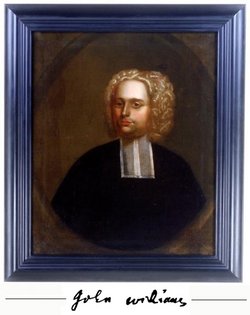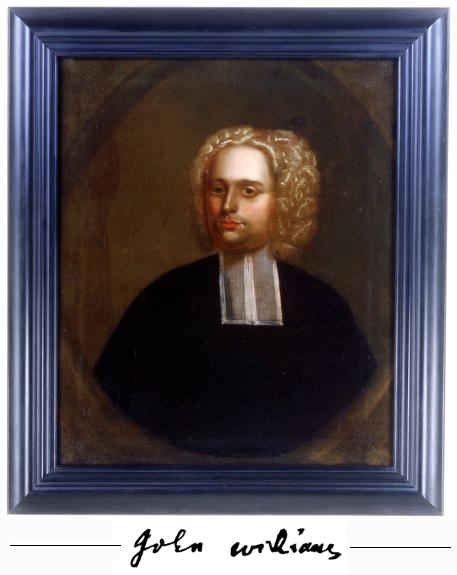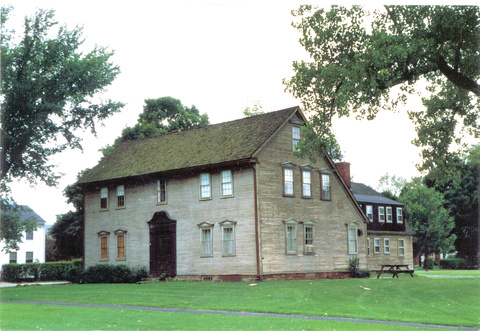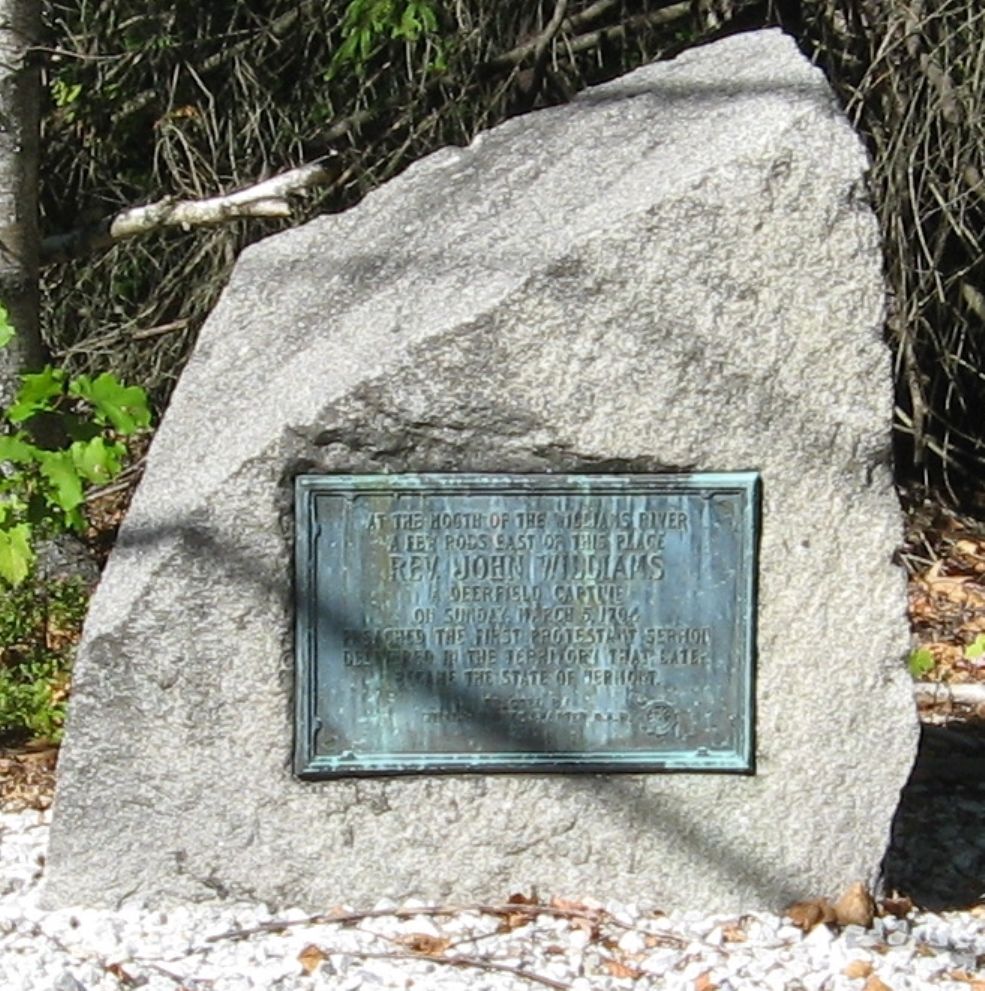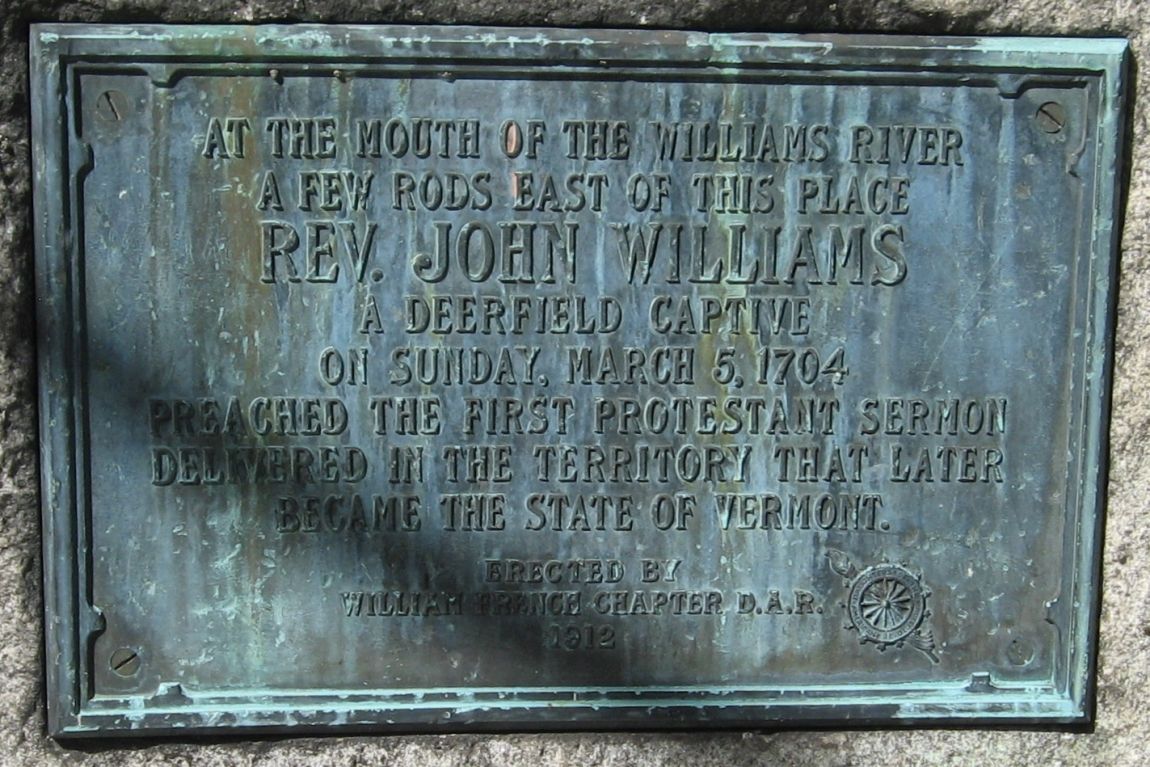Almost from the beginning of Williams' ministry, Deerfield was in peril of French and Indian attack. Like many of his colleagues, Williams believed the border wars to be occasioned by God's dissatisfaction with his spiritually apathetic people; nevertheless, he met danger courageously and exhorted his people to stand their ground. When Queen Anne's War began, he urged Governor Dudley to strengthen the Deerfield fortifications, but the warning was too late. Before daybreak, Feb 29, 1703/4, a party of French and Indians sacked the town, killed many inhabitants, including Williams' two youngest children, and carried the rest into captivity. Williams' wife, weakened by recent childbirth and unable to withstand the hardships, was murdered by the savages. Williams was well treated, although he was separated from his children and suffered exposure, hunger, and grief. The captives were detained at Fort Chambly, where the Indians, seconded by Jesuit priests, spared no effort to convert them to the Catholic faith. Williams counteracted their exertions among his fellows so effectively that the priests sent him to Chateauviche, where he remained more than two years. Finally Governor Dudley effected his release and Williams returned to Boston, Nov. 21, 1706.
During the following winter he preached in churches of boston and vicinity and prepared, with Cotton Mather's help, "The Redeemed Captive Returning to Zion" (1707), a book which won wide approval as a testimony of Congregational fortitude against "Popish Poisons." Despite continued Indian depredations and more lucrative offers, he returned to his post in January 1707, where "his Presence...conduced much to the rebuilding of the Place" On Sept. 16, 1707, he married Abigail (Allen) Bissell of Windsor, Conn. He served as chaplain in the expedition of 1711 against Port Royal and, with John Stoddard, as commissioner to Canada (1713-14) for the return of English prisoners; he regularly attended the yearly meetings of clergymen in Boston and in 1728 preached the convention sermon, Deploring the religious indifference of his age, he strove to restore the pristine spiritual enthusiasm of Massachusetts with sermons devoted to the principle "That it's a high Privilege to be descended from godly ancestors; and 'tis the important Duty of such...to exalt the God of their Fathers (A Serious Word To The Posterity of Holy Men, 1729, p.2), He died at Deerfield, survived by his second wife, their five children, and six children of his first marriage.
Source: "Dictionary of American Biography" New York: Charles Scribner's Sons, 1937. vol. XX, p270.
Almost from the beginning of Williams' ministry, Deerfield was in peril of French and Indian attack. Like many of his colleagues, Williams believed the border wars to be occasioned by God's dissatisfaction with his spiritually apathetic people; nevertheless, he met danger courageously and exhorted his people to stand their ground. When Queen Anne's War began, he urged Governor Dudley to strengthen the Deerfield fortifications, but the warning was too late. Before daybreak, Feb 29, 1703/4, a party of French and Indians sacked the town, killed many inhabitants, including Williams' two youngest children, and carried the rest into captivity. Williams' wife, weakened by recent childbirth and unable to withstand the hardships, was murdered by the savages. Williams was well treated, although he was separated from his children and suffered exposure, hunger, and grief. The captives were detained at Fort Chambly, where the Indians, seconded by Jesuit priests, spared no effort to convert them to the Catholic faith. Williams counteracted their exertions among his fellows so effectively that the priests sent him to Chateauviche, where he remained more than two years. Finally Governor Dudley effected his release and Williams returned to Boston, Nov. 21, 1706.
During the following winter he preached in churches of boston and vicinity and prepared, with Cotton Mather's help, "The Redeemed Captive Returning to Zion" (1707), a book which won wide approval as a testimony of Congregational fortitude against "Popish Poisons." Despite continued Indian depredations and more lucrative offers, he returned to his post in January 1707, where "his Presence...conduced much to the rebuilding of the Place" On Sept. 16, 1707, he married Abigail (Allen) Bissell of Windsor, Conn. He served as chaplain in the expedition of 1711 against Port Royal and, with John Stoddard, as commissioner to Canada (1713-14) for the return of English prisoners; he regularly attended the yearly meetings of clergymen in Boston and in 1728 preached the convention sermon, Deploring the religious indifference of his age, he strove to restore the pristine spiritual enthusiasm of Massachusetts with sermons devoted to the principle "That it's a high Privilege to be descended from godly ancestors; and 'tis the important Duty of such...to exalt the God of their Fathers (A Serious Word To The Posterity of Holy Men, 1729, p.2), He died at Deerfield, survived by his second wife, their five children, and six children of his first marriage.
Source: "Dictionary of American Biography" New York: Charles Scribner's Sons, 1937. vol. XX, p270.
Inscription
Here lyes ye Body of the
Rev. Mr. John Williams
The Beloved & Faithfull
Pastor of this place: Who
dyed on June ye 12th 1729
In the 65th Year of his age.
Rev.14:13 Write Blessed
are ye Dead, which die
in the Lord.
Family Members
-
![]()
Rev Eleazer Williams
1688–1742
-
![]()
Esther Williams Meacham
1692–1751
-
![]()
Rev. Dr. Stephen Williams Sr
1693–1782
-
![]()
Eunice Waongote Marguerite Kanenstenhawi Williams Arosen
1696–1785
-
![]()
John Williams
1698–1704
-
![]()
Rev Warham Williams
1699–1751
-
![]()
Jerusha Williams
1704–1704
-
![]()
Abigail Williams Silliman
1708–1787
-
![]()
John Williams
1709–1714
-
![]()
Eliakim Williams
1711–1725
-
![]()
Maj Elijah Williams
1712–1771
Advertisement
Records on Ancestry
Sponsored by Ancestry
Advertisement
